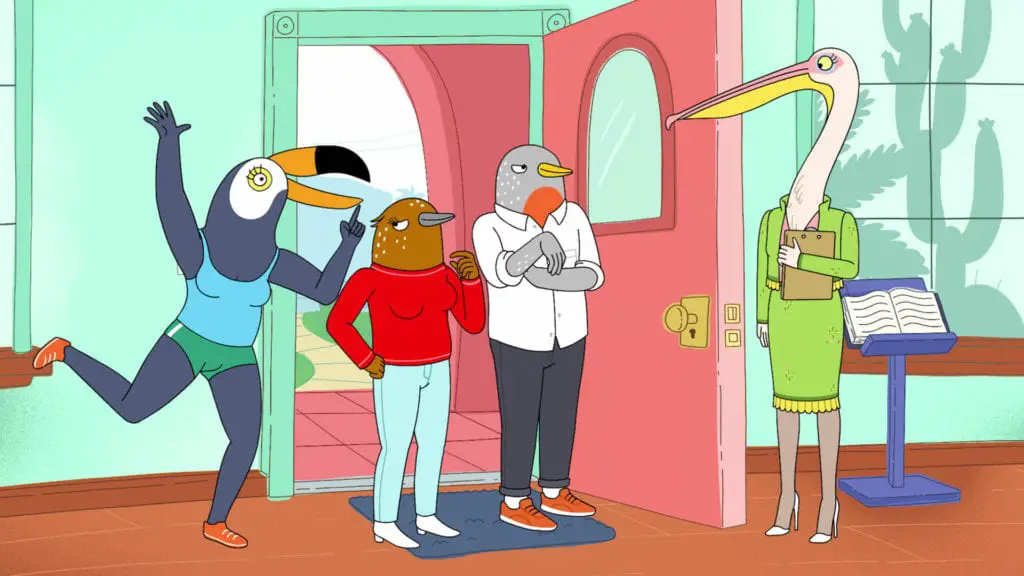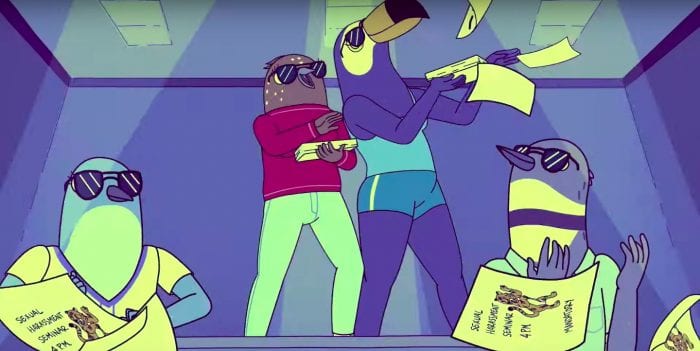After 5 seasons working as a producer and designer on the absolutely incredible Bojack Horseman, Lisa Hanawalt’s own series, Tuca and Bertie was announced last year. The similarities to Bojack were easy to make. The anthropomorphic animals and sense of humor were immediately recognizable. You’d be forgiven for going in expecting something very similar. Lisa Hanawalt would be forgiven for sticking to said formula. It works. Bojack rules.
Thankfully, she instead created something that, while recognizable, is decidedly its own show. Tuca and Bertie rules, too, and it rules by being its own story. One that is remarkably fun and creative, easily enough so to overlook what few things didn’t work for me.

Birds of a Feather
If there’s a comparison to another show to be made, I suppose, it is not Bojack Horseman but rather the recently-ended and also amazing Broad City. Tuca is very much an Ilana; brash, outspoken, sexually liberated, bouncing from job to job experimenting with life. Bertie is the Abbi. She plays the “straight man” of the relationship, struggling with her personal and professional goals in life and the anxieties preventing her from acting towards them with the same fervor that Tuca approaches everything with.
Tuca and Bertie very much relies on its main characters and their relationship to keep you interested. The show enters at a transitional moment for the two, as Tuca moves out of Bertie’s apartment so that Bertie can live with her boyfriend. From here they deal with the change in the dynamic of their friendship, their careers, their love lives, their anxieties, their dreams and motivations, and generally just how to be a healthy, adjusted adult in the modern world.
They easily carry the show and I can’t imagine a viewer not immediately connecting to at least one of them. Personally I went right for Bertie, the shy ball of self-sabotaging anxiety struggling to decide what she wants out of life. Seeing her fuss around with her anxiety shoes, her constant imaginings of what she will do in a scenario, the realities of what happens in those scenarios, and so forth just charms the hell out of me and immediately draws me in.
Despite being the more “boring” character, the show does not hesitate to craft excellent jokes around her. Yet it never does so in a way cruelly making fun of people like her.
Tuca isn’t quite my style, but that has nothing to do with the way her character is written. It’s purely a personality thing. She’s a very fun character, one who is allowed to be open, loud, crass, and drive most of the physical humor while also being a fully realized character. She has her own anxieties, as she faces her own failings in life. She lives off her rich aunt, can’t hold a steady job, and harbors a dependency on her friendship with Tuca that makes things go off the rails when she feels that dependency threatened.
Together they complement each other in a way that both makes clear why they’re such good friends and also make for a truly terrific dynamic to carry a show.
The supporting characters also engaged me easily. Bertie’s boyfriend Speckle is an adorable pushover dork who Bertie takes for granted, to the order of a significant plot point later in the season. They have a cool plant neighbor who helps them with their issues from time to time. A famous bakery owner inspires Bertie’s dreams but serves as the catalyst for one of the heaviest storylines. Tuca’s rich aunt is one of the most easily hated characters and provides appreciated context for her character.
My main complaint is that, outside of Speckle, no one besides Tuca and Bertie gets truly fleshed out. They serve the main characters, sometimes only for one episode, and then vanish or at least never get any real focus the rest of the season.
As you’d expect from a show created by a woman and centered on the friendship of two women, Tuca and Bertie strikes at a decidedly women-centric view of the world. Tuca spends an episode dealing with the equivalent of an ovarian cyst represented through an egg she has surgically removed. Bertie deals with workplace sexism. They deal with STDs, sexuality, women’s rights groups, their relationships, and how their very different personalities face down their problems.
Also as you’d expect from show created by a woman, it tackles these issues with a focus on women and their experiences that feels authentic. After all, it is.
What also sticks out is just how crude this women’s view of the world can be. I mean this very much in a good way and not the least bit insultingly. Tuca and Bertie is unapologetic about letting its main characters embrace the same kind of crassness no one blinks at in male-dominated comedies. There’s nudity and sex everywhere. They make toilet jokes, pop zits, masturbate in public, etc. The animation clearly enjoys itself with the variety of gross shots prevalent throughout.
Yet it never, ever feels gross for the sake of it. Tuca and Bertie also never relies on crude humor for the sake of it. If anything it lends to the experimental nature of the show. The show never stops trying new things with the animation. Some sequences will mimic 2D video games, or render everything like balls of thread. Characters transition from relatively normal (for human-like animals) to Looney Tunes-style wackiness at the drop of a hat, and vice versa.
Hanawalt and her crew clearly have a really good time making the show, and don’t really restrain themselves. Or if they did, I can’t imagine what the second season will look like. Tuca and Bertie hits a pretty stunning balance between absurd wacky humor, surreal storytelling, and deep, meaningful character moments.
The show also never shies away from representation. One episode involves Bertie’s old swimming coach, who lives with her adorable owl wife and also mentions an ex-husband. Tuca clearly has a sexual interest in just about anyone and everything, including said swimming coach. It also does not shy from allowing women’s sexuality. Tuca has an episode dedicated to online sex work that never judges her in any way. In fact, Speckle gets in on it by accident. When he realizes what’s happening, his concern is not what he was doing but the new friendship he created with someone through it.
Tuca and Bertie does a lot to feel inclusive to everyone.

Leaving the Nest
While Tuca and Bertie certainly establishes an identity separate from Bojack Horseman, much of what makes that show work is also present in Tuca and Bertie. Naturally, of course, considering Hanawalt’s involvement in the creation and production of Bojack.
Tuca and Bertie takes the animal world of Bojack to an even more surreal level. Rather than just animals living like humans, there are now sentient plants, bugs, phones, and even body parts, as seen in an episode where one of Bertie’s boobs gets so upset over a colleague’s sexual harassment that it literally leaves her body for the day. Then of course among all the sentient birds you get a normal hawk. It’s a very creative and strange world where I ended up not at all surprised by something moving and speaking.
One of the great triumphs of Bojack is the way it can so sneakily punch you in the gut with emotional moments. You spend 15 minutes watching something funny before a shocking moment leaves you crying. Or something totally surreal and weird gives way to a hard, very human truth. Tuca and Bertie also manages this jarring yet very effective tone shift. If anything it manages an even harder balance because of the far more absurd nature of the show.
Besides the even goofier nature of the people of the world, the show embraces its cartooniness constantly. Onomatopoeias are visible and interactive. Characters move in exaggerated, impossible ways. They interact with thought bubbles. Where the absurdity of Bojack lies in having anthropomorphic animals live grounded, realistic lives that incorporates some elements of their animal behavior Tuca and Bertie is straight up, proudly absurd. It’s a more traditional cartoon.
Sometimes it feels a bit much. The amount of gags packed into any given frame sometimes feels overwhelming, like you’ll need to watch an episode 3 times to truly appreciate everything it has to offer. Which, by the law of good TV, means you actually need to watch it like 5 times. This isn’t a bad thing by any means. However it can lead those more inclined toward the behavior to want to pause and absorb every second of it, just to make sure you appreciate everything the show wants you to appreciate.
For me, this constant zaniness made the moments of genuine emotion even stronger. Seeing an episode filled with mutated sex bugs turn into a harrowing panic attack hits hard. So does seeing Tuca try to distract herself with partying, only to have it throw her deeper into her loneliness. Tuca and Bertie 100% carries over Bojack’s incredible ability to make you feel, often unexpectedly. The show rarely pulls it punches when it comes to the difficulties of its two main characters.
However, Tuca and Bertie offers entirely different lessons that distinguish it considerably from Bojack. At its heart, Bojack is a study of depression. It can be heavy and hard to get through. Tuca and Bertie is a show about two women dealing with friendship and adulthood. It certainly hits heavy subjects such as assault and anxiety, but all the while maintains a more lighthearted tone. Bojack will spend an entire episode punching you in the gut. This show will do it once and then move on, trusting that you understood the point the first time.
I’m quite impressed by this balance. I’m also appreciative that Lisa Hanawalt so fearlessly forged her own path for this show. It would have been so easy to simply copy and paste the Bojack formula, a formula she already played a significant role in discovering.
If anything the process of the Bojack formula seems to have made it easier for Tuca and Bertie to find its own. Even the most ardent Bojack fans tend to suggest the show with the caveat of “it takes some time to figure itself out, stick with it.” Tuca and Bertie knows what it is right away, and settles into a groove much quicker.
Final Verdict
The result is a refreshing, excellent show that never stops feeling fun, rewarding, and fresh. Tuca and Bertie takes elements of what other shows try and blends them together to produce something more than those parts.
I went into this show warily. The expectations created by Bojack are hard to live up to, and it can be so easy to walk away underwhelmed in comparison. Instead I walked away overwhelmed. Tuca and Bertie is a fun, imaginative, refreshing show, one that knows exactly what it wants to be and succeeds at its goals. It doesn’t always work. It might be too weird sometimes. I don’t always feel what I think the show wants me to feel. The jokes don’t always land.
The misfires pale in comparison to the many things Tuca and Bertie does right. Netflix has really become the home for excellent animated television in the past couple years, regardless of what you’re looking for. Tuca and Bertie is an excellent, excellent addition to the lineup, and instantly one of my favorites. I can’t wait for more.
Images courtesy of Netflix

